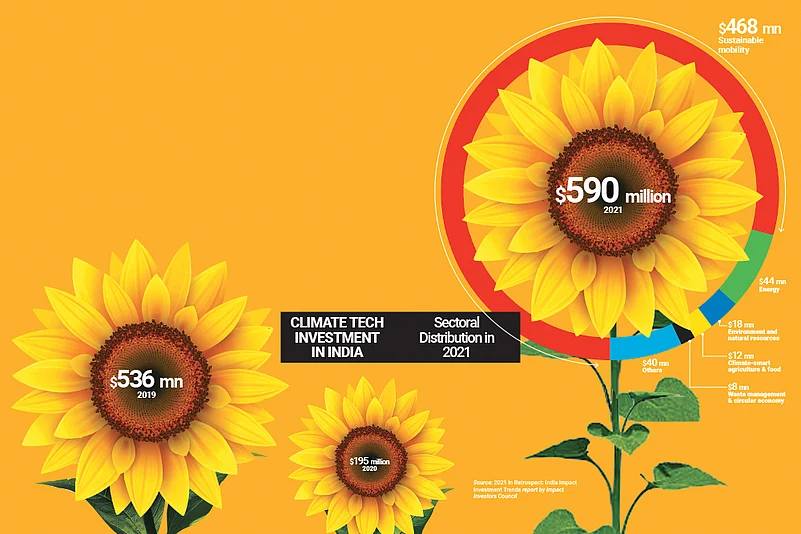Last month, Buyofuel, an online platform for alternative fuels—raised an investment of Rs 11.5 crore in its pre-Series A round led by Inflection Point Ventures (IPV). Major players like Venture Catalysts, LetsVenture, Lead Angels Fund and Gruhas Proptech had participated in the round. “It was easier than expected,” says Kishan Karunakaran, founder and CEO, Buyofuel. Karunakaran is happy that the year is ending on a note that will enable their start-up to solve challenging demand-and-supply issues in the field of biofuels.
In June this year, business-to-consumer (B2C) solar start-up SolarSquare, which creates and installs solar rooftop panels for residential buildings and commercial buildings, raised $4 million, with Good Capital becoming the primary investor and Zerodha co-founder Nikhil Kamath’s Rainmatter, Singapore-based Symphony Asia and angel investors like Ashish Goel of Urban Ladder, Oyo’s chief strategy officer Maninder Gulati and NoBroker co-founders Akhil Gupta, Amit Kumar Agarwal and Saurabh Garg as other participants.
Conducive Environment
Start-ups in climate technology are attracting an increasing number of investors. Though climate tech start-ups receive less than 5% of total venture capital funding, the scene is likely to change in the coming years as more investors get interested. “Almost every VC today is interested at least somewhat in climate tech,” says Narasimhan Santhanam, director, Energy Alternatives India (EAI).

In November 2022, EAI had organised Climafix Summit, a congregation of 215 climate start-ups from all over India, in association with Indian Institute of Technology Madras (IIT-M) in Chennai. The summit hosted 20 sessions on themes like renewable energy, energy efficiency, energy storage, low carbon mobility, digital for decarbonisation, low carbon agriculture and food, low carbon materials, water sustainability, waste management and GHG (greenhouse gas) management. There were about 40 VC firms present at the event and each session was hosted by an investor.
Rising Interest in Climate Technology
Climate tech will produce eight to 10 Teslas, a Google, a Microsoft and an Amazon, Bill Gates, co-founder of Microsoft and founder of Breakthrough Energy, an umbrella organisation promoting use of sustainable energy, had said at the SOSV Climate Tech Summit in 2021. His words can be seen as a pointer to the kind of growth that is expected in the sector.
There are many reasons for the rising interest of VCs in climate start-ups. The heightened awareness around climate change fuelled by extreme weather events across the world, seminal events like the United Nations’ COP (Conference of the Parties) 26 and 27, net-zero commitments by nations, including India, are a few others. At COP 26 held in Glasgow, Prime Minister Narendra Modi had pledged that 50% of India’s energy demands would be met by renewable sources by 2030 and the country would achieve net-zero targets by 2070.
According to a study titled “Five years on: Global climate tech investment trends since the Paris Agreement” by London & Partners and Dealroom, VC funding for climate tech increased significantly after the signing of the Paris agreement, with more than five times funding in 2021 than in 2016. According to this report, India ranked ninth in terms of climate tech investment during this period.

Sumeet Singh, partner, Climate Angels, gives credit to innovation happening in the sector. “We invested in Praan which is rethinking the complete process of air purification or air flow management at the industrial level,” he says, adding, “Praan has a new technology around how to capture dust particles on the shop floor.” For instance, there is a lot of particulate matter suspended in the air at a sugar plant, which gets carried through the wind, he explains. “If you can capture the matter at the plant level, it will ensure the employees’ health and safety by reducing air pollution,” Singh avers.
Age of EV
The electric vehicles (EV) industry is another sector that has piqued investors’ interest. Looking at it as a sunrise sector, the government is promoting its adoption across the country by policy support and investments in infrastructure like EV charging stations and batteries. According to the “Annual India EV Report Card: FY2022” published by JMK Research & Analytics, EV sales surpassed 4 lakh vehicles in FY22. While the sales of registered electric two-wheelers (E2W) accounted for more than 55% of the market share, passenger electric three-wheelers (E3W P) claimed around 35% of the market share.
Bengaluru-based Altigreen, which manufactures commercial electric vehicles for last-mile transportation, raised Rs 300 crore in its Series A funding round held in February this year. The EV start-up has received support from Sixth Sense Ventures, Reliance New Energy, Xponentia Capital, Accurant International, the United States and Momentum Venture Capital, Singapore. Next year, it hopes to raise Rs 800–Rs1,000 crore to support its expansion in domestic and international markets.
Amitabh Saran, founder and CEO, Altigreen Propulsion Labs, feels that EVs attract a large chunk of investments for a reason. “The source of power may change. Today it is lithium, tomorrow it can be sodium and then hydrogen, but the vehicle will remain electric.” All fuel lines and pipes of the combustion engine have been replaced by wires, he says. “Also, combustion engines work at anywhere between 20-25% efficiency whereas electric motors run at 90% efficiency. There is a realisation that EVs are here to stay,” he observes.
Saran adds that while everyone is looking at the sector with a lot of interest, there are only a handful who make significant investments. “Today when you approach VCs, they will never say no. While a majority of them are still fence sitters, there are a few who are willing to take that bet. There are climate angel funds that give anywhere between Rs 5 lakh and Rs 1 crore and then there are a few who are able to make significant investments, like in our case. But they have their own ways to decide which companies to invest in,” he says. They invest on the basis of the foundation of the company, whether it is a trader or an assembler or someone who has added value in the entire lifecycle of the product, Saran elaborates.
Of course, EV gets a large chunk of the pie, but investors are willing to explore various angles of climate tech and not restrict themselves to solar and EV, says Karunakaran.
Deep Technology and The Other Side
There has been emergence of deep tech-focused funds for climate start-ups like Energy Impact Partners and Fifty Years. Then there are VCs setting up dedicated funds to battle the rising GHG emissions. Led by Anjali Bansal, Mumbai-based Avaana Capital set up Avaana Climate and Sustainability Fund to make investments in the fields of sustainable agriculture and food systems, mobility and supply chains and energy and resource management. The VC firm invested in six climate tech start-ups in the last two years.
Last month, Merak Ventures and Huddle launched ClimAct, a climate tech accelerator programme which will invest in early-stage entrepreneurs working in the area of agricultural waste and supply chain efficiency, mobility and transportation, climate finance, carbon accounting and sequestration, and related digital solutions. International VC firm Lowercarbon Capital has joined the club with investment in River, an Indian EV manufacturer, and SolarSquare.
While the landscape of climate tech start-ups looks buoyant, Santhanam raises an alarm. “A deep tech investor ecosystem is emerging for climate tech, which is a welcome thing, but I am not sure if there is a deep tech support innovation system in the country to help these start-ups and investments. Without this support, most deep tech investments will die an unfortunate death.”
Lot Riding on Initiatives by Government
Government support and regulatory framework also signal growth for the climate sector, thereby presenting opportunities to investors. The government has taken several measures to encourage domestic research and production of renewable energy (RE) technologies. India being one of the biggest markets for RE with the country’s solar energy production expected to triple by 2030, the field becomes an attractive proposition for the investors.
Santhanam points out that 35% of the total investments in the climate sector are being made in start-ups operating in the area of energy efficiency and energy storage.
When it comes to investors, only a few understand climate tech with a holistic perspective and most apply traditional VC frameworks and expectations to climate tech investments. “And that may not work,” underlines the clean energy and cleantech industry expert.
The funding in climate start-ups has gained traction in the last couple of years and can thrive if the gaps are plugged.































